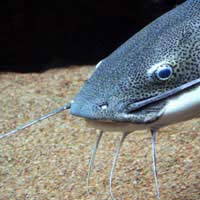Catfish

Active hardy and full of character, catfish can make a delightful addition to any aquarium. Whether you're looking for sociable members of a community tank or just somebody to eat up that troublesome algae, there's almost certainly a catfish for you.Catfish are notable for having thick, leathery skins, often beautifully patterned, rather than scales. They also have barbels, whisker-like appendages which provide them with a great deal of sensory information. They are quite physical creatures and you should not be disturbed if you see them trying to touch other fish or even your own hands when you're cleaning the aquarium.
Although they may vary a great deal in their habits, most catfish have certain basic things in common. Since they are bottom-dwelling fish they prefer a soft substrate such as sand or smooth gravel; they often enjoy having larger polished stones to sit on. Make sure that they have plenty of hiding places available. Pieces of bogwood can provide shelter and also give them something to chew on, helping to keep their mouthparts in good condition.
Types of Catfish
With so many species to choose from, it can be difficult to know what will work best for you, but the following are all very popular choices for the aquarium:- Otocinclus -Small and peace-loving, happiest with several of its own kind, this attractive stripy fish is a great algae eater. A golden variety is also available.
- Zebra Pleco -With its stunning black and white markings, this beautiful fish is an aquarium favourite. However, it doesn't eat a lot of algae, preferring meaty foods. It does best in a tank without other bottom-feeding fish.
- Cory -Available in several varieties, this popular fish prefers to be in a group of its own kind, though it is non-aggressive with other fish. Its diet needs to be supplemented with frozen or live meaty foods.
- Bristle-nosed Catfish -A great algae eater, this active fish will also eat any other food which drifts down to the bottom, reducing the risk of pollution in your tank. It is also easy to breed.
- Clown Catfish -Popular for its striking markings, this is a highly active fish which maybe territorial with other bottom dwellers.
Caring for your Catfish
Although most species of catfish eat algae, it's still important to make sure that they're getting all they need, and they generally benefit from being provided with food pellets or algae discs. Since most species are nocturnal it's best to feed them shortly after lights out - this will also discourage other fish from stealing all their food. If you have an armoured catfish it's especially important for you to make sure it's eating, as you may not notice if it's losing weight - its armour won't shrink just because it does.Catfish sometimes suffer from bullying by other fish and may become aggressive in response. If you suspect this is happening, make sure to observe the tank carefully so you can determine where the trouble is starting. It's less likely to be a problem if you keep several catfish together. Most species of catfish can live peacefully in a community with other fish, but carnivorous ones will eat fish who are half their size or smaller.
Despite being hardy where water quality is concerned, catfish can be very vulnerable to the side effects of medication. If you need to medicate your main aquarium you should first remove them to a quarantine tank.
Catfish are great fish for beginners and can also be a valuable addition to a mature aquarium. Though they can be shy at first, once they've established themselves they're lots of fun to watch and interact with. You'll soon find it hard to imagine how you ever got along without them!


Re: Providing Toys for Your Fish
Toys for my baby Flowerhorn fish??? And where to buy them ?
Re: Snail Infestations in Your Fish Tank
My coy fish just started darting and running into the glass. I've checked them over and see nothing on the outside of…
Re: My Pet Fish is 20 Years Old is this a Record?
I purchased a gold fish on April 1997 for my daughters and the same fish is alive and well. The reason I'm…
Re: Dealing with Bullying Between Fish
I have 3 Bolivian butterfly rams not sure the genders,but at the start all 3 were fine but just recently we’ve notice 2…
Re: Using Electrical Devices Safely In Your Aquarium
Monthly water changes isn’t enough I would be changing at least a 1/3 weekly. I do it more often than…
Re: Dealing with Bullying Between Fish
I have a blue gourami that has been living with 4 platty’s and a yoyo loach. I noticed a couple of my fish missing. I…
Re: Lighting for Aquatic Animals
Will a UV submersible light harm my tropical tank and fish. Thanks for any help
Re: Dealing with Bullying Between Fish
Recently put 12 new Africans in my 55 gallon tank. Many rocks and hiding places. After 2,3 days one of them, obliquidens,…
Re: Food Quantities
Just noticed smallest neon tetra tail is missing and white on the edges. Another also has half of tail missing. They was OK a few days ago. I only…
Re: Providing Toys for Your Fish
I have guppies and I think the ideas for toys might be too big, I have tried training them but they aren't responding.